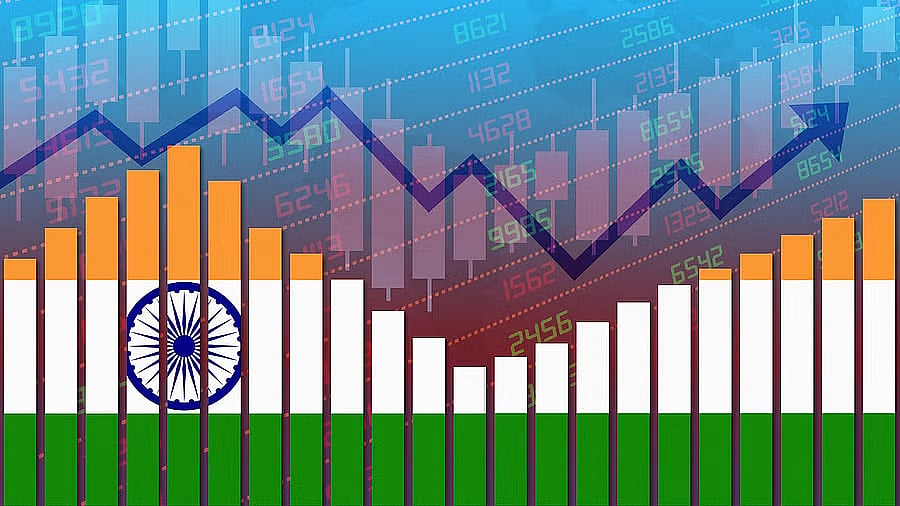
The economy is resilient and has sound fundamentals, as noted by the CII chief (Image for representational purposes.)
Credit: iStock Photo
As India emerges from a tense, albeit short-lived period of conflict with its western neighbour, the focus must inevitably shift to other issues, including the economy.
This was highlighted in recent interviews by Confederation of Indian Industry (CII) chief Sanjiv Puri who was confident that 6.5 per cent growth can be achieved in the current fiscal (2025-2026) owing to the resilience of the economy. He felt this level of growth was possible since the country has a robust economic foundation. Yet to achieve long term objectives, he underlined the need for setting a higher target of 7-8%.
Puri also pointed to geopolitical uncertainties affecting investment flows despite increased interest in segments like energy, transportation, metals, chemicals, and hospitality. He did not refer to the impact of border tensions between India and Pakistan except to voice the industry’s support for the government in all its actions. Even so, corporate India as well as policymakers must recognise that any prolonged friction between the two countries will leave its mark on the overall economy. The recent face-off lasted for only a few days and may not have an immediate fall-out, but a longer conflict is bound to have wider ramifications.
These issues need to be considered in future growth projections since the current ceasefire appears to be a tenuous one. It was breached by intermittent firing from Pakistan, even on the day of the ‘ceasefire’ announcement. The guns may have been silenced eventually, but unresolved issues are still on the table. Prime Minister Narendra Modi, in his May 12 address to the nation, has clarified that Operation Sindoor has only been suspended, and further terrorist activity emanating from Pakistan will invite a swift reprisal. It becomes difficult to have confidence in the prospect of lasting peace in such an uncertain scenario.
Given this, one must consider whether India’s fast-paced economic growth is under threat. In case there is a resumption of hostilities, one of the first casualties would be the flow of investments from abroad. In recent weeks, the comment of Apple CEO Tim Cook over the sourcing of iPhones from India has attracted widespread attention. He disclosed that iPhones meant for the US market would be largely sourced from India in the coming months. This is a strategy aimed at avoiding the higher tariffs envisaged on products from China. It has raised hopes of expanding investments from the tech giant. Other multinationals have also been adopting a ‘China Plus One’ policy, seeking alternative locations for fresh investments. India has been high on the radar of these companies.
The question is whether such investments will continue to flow at the same rate in the case of continuing strife at the borders. Corporates, which value stability above all else, may have second thoughts in such a scenario. Yet India’s political stability and security have always been a big factor in its favour for foreign investors. This is likely to continue as a big advantage in continuing to lure foreign direct investment. It continues to be a haven of peace and rapid economic growth in South Asia, even if any prolonged hostilities create short-term disruptions for trade and industry.
What must be of equal concern in a tense situation is the safety and security of energy installations as well as industries located in the western region, in Rajasthan, Gujarat, and Maharashtra. The country has a host of oil and gas platforms in both onshore and offshore areas in this area. Linked to these are a multiplicity of manufacturing units in these states, which are among the most industrialised in India. Any slowdown or stoppage of operations at these plants will have repercussions on overall economic growth.
On the positive side, the economy is resilient and has sound fundamentals, as noted by the CII chief. It has in the past been able to overcome the disruptive impact on global supply chains following the Ukraine-Russia war. The skyrocketing of crude prices to $130 per barrel at the time had been worrisome, but India made a pivot to enhance supplies from Russia at discounted rates.
Inflationary pressures have also been successfully contained despite external headwinds over the past few years. It is, therefore, likely that a flare-up of a few weeks or even months will not significantly reduce the pace of developmental activity.
There are bound to be short-term constraints on normal economic activities, especially in the northern region, but these are not likely to extend throughout the country. Given the experience with the economy having bounced back from COVID-19 and geopolitical tensions, one can be relatively confident that it will weather any future war-like crises as well.
(Sushma Ramachandran is a senior journalist.)
(Disclaimer: The views expressed above are the author's own. They do not necessarily reflect the views of DH.)